Job-keeping or vocational integration for victims of domestic violence
Preventing and combating violence towards children, adolescents and women, and protecting victims and groups at risk.
Grant Agreement Number: JLS/2008/DAP3/AG/1345
Funded by: DAPHNE III / EC Duration: 12/2009 – 12/2011

Challenge
According to a survey conducted by Belgium’s Institute for Gender Equality, one in seven women has been subjected to at least one act of violence by her (ex-) partner within the last 12 months. In most cases the abusers are male and the victims female.
Linking domestic violence and working life is arguably counterintuitive. Τhere is clear evidence that domestic violence does intrude into work and vocational integration. Domestic violence has a big impact on victims’ working lives – it stops them doing or finding a job. Yet keeping or getting a job is vital to them.
Innovation
The project’s main objective was to raise awareness among employment/professional and training communities about people in or accessing work who are victims of domestic violence. Its innovative nature lied in the fact that it aimed to develop a process, integrating a range of measures to deal with different aspects of the issue of domestic violence, including the training of the target groups, the implementation of concrete actions in the workplaces or places of integration into employment, and the creation of a database of specific solutions.
Action
The project involved developing a training course to enable a target group of union representatives and vocational or employability training providers to assist victims to enter into or to stay in employment.
KMOP worked with a group of professionals (social workers, psychologists, etc) that provide socio-psychological care to victims of violence and delivered training services that have enabled them to support the beneficiaries in finding employment or staying in work. Training services also involved the development and validation of a dedicated training course for trainers to secure the life-period of the methods and tools that emerged under this project.
Other actions involved the drafting of policy recommendations for inclusion measures in the private sector (trade unions, enterprises, companies, etc), awareness-raising activities focused on trade unions and companies and the development of dissemination material with the aim to provide information to victims of violence, at the workplace or at the time of integration in employment.
Read the manual for combating domestic violence in Greek and English.

European Commission’s support for the production of this content does not constitute an endorsement of the contents, which reflect the views only of the authors, and the Commission cannot be held responsible for any use which may be made of the information contained therein.
Project Partners

Innovation Centre





Violence (Bulgaria)

